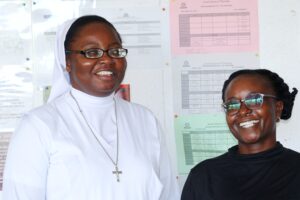
On 26 March 2025, Hekima University College hosted a students’ debate on the theme: “Is Women’s Empowerment the Key Driver of Social, Political, and Theological Change in Africa?” This event was organized by the Hekima University College Student Association (HUCSA). It was held at the undergraduate auditorium, located along Joseph Kangethe Road, off Ngong Road, Nairobi, Kenya. The reason for this theme was to critically examine whether the increasing participation of women in public life and theology could be attributed to women’s empowerment. It also sought to assess presuppositions that underline gender advocacy initiatives in Africa. Moderated by Bernardo Jimo, SJ, the debate featured Jean Avis Mburia and Sr. Inès Atangana, FMA, as the key debaters. This brought together both in-person and online participants.
Jean Avis Mburia, advocating for the motion, argued that women’s empowerment has significantly influenced policies addressing systemic injustices against women, thereby fostering justice. She cited prominent African female leaders such as Ellen Johnson Sirleaf (Liberia, 2006–2018), Joyce Banda (Malawi, 2012–2014), and Samia Suluhu Hassan (Tanzania, since 2021), highlighting their contributions to the socio-political landscape. “It was only when these women came into power that peace-building initiatives, protective policies against gender-based violence and injustice, and gender equality measures were enacted and implemented,” she asserted.
On theological change, Mburia emphasized that women’s empowerment has led to a more inclusive interpretation of religious texts and leadership within religions, fostering a holistic faith. She asserted that women’s empowerment is the key driving force behind Africa’s social, political, and theological transformation.
In contrast, Sr. Inès Atangana, FMA, opposed the motion. She argued that women’s empowerment is not the primary driver of social, political, and theological change in Africa. Instead, she viewed contemporary notions of women’s empowerment as misguided, as they disrupted traditional African society and undermined family structures and social harmony. “Women’s vocation is to give and nurture life holistically. Past societies thrived when women fully embraced their womanhood. True empowerment lies in rediscovering women’s God-given role in sustaining and enriching society,” she stated.
While participating in the debate, the audience recognized the need for Africa to rethink women’s empowerment through a dialogical approach that critically examines its benefits and challenges. Empowering women should be integral, emphasizing justice and faith while fostering an environment that allows both men and women to thrive. The debate underscored the importance of ongoing discussion on this topic.
By Chancy Mterera, SMM

